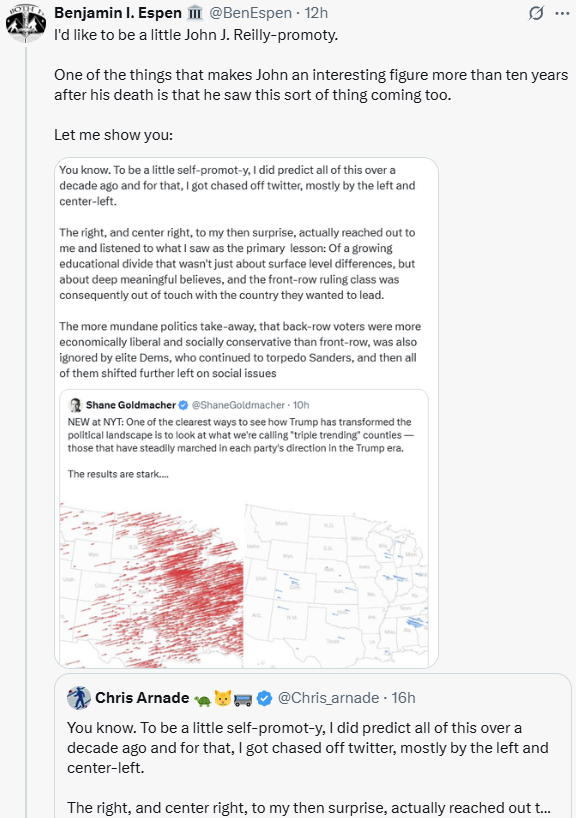The Long View: In the Presence of Mine Enemies
Here is a 2003 book review where John makes the point I highlighted yesterday; all the piss and vinegar has been taken out of the 20th century ideologies by now. In the early 21st century, we keep using the same slogans, but nobody means it.
I was also struck by John's off-hand comment that any serious history buff would have a mostly-unread copy of Mein Kampf sitting around. In the current craziness, books like Mein Kampf and Das Kapital are no longer doorstops for people with a book collecting problem, but have rather become props for people who LARP as political extremists. Last century, books like that actually changed the world. Now they are just part of the scenery.
In the Presence of Mine Enemies
By Harry Turtledove
New American Library, 2003
454 Pages, US$24.95
ISBN 0-451-52902-2
Strange as it may seem for someone who writes quite a lot about alternative history, this is the first book by Harry Turtledove I have ever read. That was partly because I did not want to take on yet another long series of novels. In the Presence of Mine Enemies is a stand-alone work, however, and the premise is obvious enough to warm the heart of any acquisitions editor. The Third Reich wins the Second and Third World Wars, but later undergoes the process of reform-reaction-collapse that ended the Soviet Union in the world we know. The characters through which we observe these events are secret Jews, living otherwise ordinary lives in and around Berlin. The title, incidentally, comes from Psalm 23:5. (A poetic rendering runs: "You spread the table before me in the sight of my foes; you anoint my head with oil: my cup overflows.")
In the Presence of Mine Enemies has many of the features common to Nazi-victory timelines. We learn once again how many St. Peter's basilicas (16) would fit into Albert Speer's Great Hall in Berlin. There are brief references to the nuclear standoff with the Japanese Empire. On the whole, however, the author is notably circumspect about filling in the details of world history to 2010, which is about when the story is set. We find out in passing that the US was neutral in the Second World War and on the losing end of the Third, which occurred around 1970. We also learn that the US capital has moved to Omaha. Similarly, though the Germanic Empire seems to be almost everywhere as an occupier, colonizer, or overbearing ally, we are spared lectures on geopolitics in a Nazi world. The author's chief conterfactual mischief concerns one Kurt Haldweim, the gerontocrat Führer whose death marks the start of the reform era, and whom we must in no way confuse with the factual Kurt Waldheim.
We do learn quite a lot about the life and ways of Heinrich Gimpel, a financial analyst at the Oberkommando Wehrmachts headquarters in Berlin and arguably the most prosaic protagonist in all possible worlds. By day he is a mild-mannered bureaucrat who fields diffident questions from Omaha about the annual financial assessment on the US; by night he is an equally mild-mannered father who instructs his eldest daughter in the rudiments of Judaism. (The children are let in on the secret when they are ten.)
Heinrich is not without passions, however. He and his hausfrau wife are fanatical bridge players. There are many pages of text like this:
"He pulled Willi's trumps, one by one; Willi couldn't make any of them good. And he made the contract-doubled.
"'A deep finesse,' Willi said mournfully, 'Who would have thought you would run a deep finesse? And who would have thought it would work?'
"'I had to,' Heinrich answered. 'It was the only way I even had a chance to make four. So I thought, why not?'"
Why not indeed? No doubt there are readers, more familiar with bridge than I, who will see ways in which these games comment on the story. Still, the ordinary amusements and vices of the characters do serve to normalize the Nazi world.
The Gimpels have a friend, another secret Jew named Susanna, who is rather more dramatic, or at least cranky. A professor of Middle English, she is a rarity as a female academic in the German higher education system. Early in the story, she goes to a conference in London of the Medieval English Association. However, she wanders across the street to the annual meeting of the British Union of Fascists, who, of course, are the ruling party of Great Britain. To her surprise, she becomes the belle of the ball.
The British fascists drink beer and favor heavy boots, but they appear here as populist good fellows, who enjoy the support of King Henry IX. They introduce her to a movement for democratic reform that seeks to use the resources of Nazi doctrine. The Eurocommunists of our own 1970s deployed Marx's Economic and Philosophical Manuscripts against Leninism. In this alternative world, reform Nazis cite a text from the first edition of Mein Kampf, which emphasizes the need for the Party leadership to be democratically responsible to the Party membership.
I suspect that every history buff on Earth has a largely unread copy of Mein Kampf on his bookshelves. My Sentry edition, the 11th printing of Ralph Manheim's translation, has the original passage at page 344. There is also a footnote containing the Second Edition version, which Hitler made after he suppressed his rivals and became keen on the Führerprinzip.
The concept of "reform Nazi" sounds no less odd to the principal characters in this story than it does to us. Even as Heinrich and Susanna root for well-meaning Heinz Buckliger, the unfortunately named new Führer, they realize that no one has said a word about rehabilitating the Jews. Indeed, though Jews in Germany are almost as rare as elves, the SS has not relaxed its hunt for them, and antisemitic propaganda continues to be an important feature of the school curriculum. It would be giving away too much of the story to relate just how these people come to the attention of the security services, but that aspect of the book does provide real suspense.
On the other hand, the parallel histories of the reform movements in the Germanic Empire and in our own Soviet Union are close enough to preclude much suspense. The similarities extend even to the publication of critical letters-to-the-editor, alleged to be from ordinary citizens opposed to reform, but actually planted by reactionary party bosses. There is nothing objectionable in an author's adhering to his story's premise: Tolkien says that hobbits like their books to be set out fair and square with no contradictions, and I am inclined to agree with them. However, the parallel to the Soviet Union does not give much guidance about the underlying causes for the crisis of the Germanic Empire. We are told that the budget is chronically in deficit, and that the Reich's software industry is falling behind its Japanese competitor's. (The Reich's standard operating-system is deplorably clunky, which suggests another real-world parallel we will not pursue.) The late Soviet Union, it has been argued, was in many ways just an oil-state that collapsed when commodity prices fell in the 1980s. Even if that assessment is too flippant (as it almost certainly is), some comparable mechanism would have made the premise of this book seem less arbitrary.
Stories based on greater success for the Nazi regime than occurred in the real world are not rare. Some of them are exercises in sado-masochism; some seek to show off a detailed knowledge of the Nazi era: I have run across only one that seemed intended as apologetics for the Nazis. In the Presence of Mine Enemies is proof that it is possible to write a novel with this premise that does not further strain credulity with a plot involving spies, Satanists, and interdimensional travel. Still, even the best of these stories ring hollow for me, in a way that goes beyond the inevitable implausibilities of alternative history.
The Nazis did not come to power with detailed plans to conquer the world. Hitler did suggest from time to time that the problem for his generation was Russia, and that the problem for the next would be America. This is the framework that Turtledove uses for his novel, and it's perfectly justifiable for fiction. The problem is that it ascribes to the Nazis a unique ability to shape the future according to their designs. History after the Second World War did not turn out quite how the victorious Soviet Union expected. The same was also true for the United States, even after the end of the Cold War. Technological progress had something to do with it, but the differences between one generation and the next were more important. More important still was the fact that styles of life and philosophy continued to change according to the rhythms of modernity, even in the isolated Soviet Union.
Oswald Spengler, to take my favorite macrohistorian, was often wrong, but about the Nazis he was mostly right. He understood that the movement was in many ways simply incompetent. He saw them as nothing more than an incident in the era of Western modernity, an era which he expected to last through the 21st century. The end of the story for the modern world might, he thought, be a new Roman Empire. If it materialized, the sun would set on the West in a kind of political and spiritual peace. The alternative, as he saw it, was mere collapse and barbarian chaos. In either case, he had a lively sense in the 1930s that the end of history was still many generations away, and that the Nazis were dangerously deluded about their own importance.
That, really, is the problem with most stories based on unbroken Nazi success. The premise takes the Nazis at their word about the importance of the movement, and credits them with the ability to make a peaceful desert of a world that should still have several generations of tumult remaining to it. This is anachronistic both forward and backward. It is unreasonable to expect to see Spengler's imperium mundi in any timeline much before the 22nd century. It is equally unreasonable to see the mesmerizing power that political ideology held in the 1920s and '30s transposed to the early 21st century. Even Philip Dick, in The Man in the High Castle, probably stretched a point when he put a world of fanatical Nazis in the 1960s. Certainly we know that, long before the Communist regime collapsed, there were few real Marxists in the Soviet Union.
Popular uprisings rarely overthrow ideologies; rather, even the secret police eventually lose interest.
Copyright © 2003 by John J. Reilly

In the Presence of Mine Enemies (Turtledove, Harry) By Harry Turtledove



Comments ()